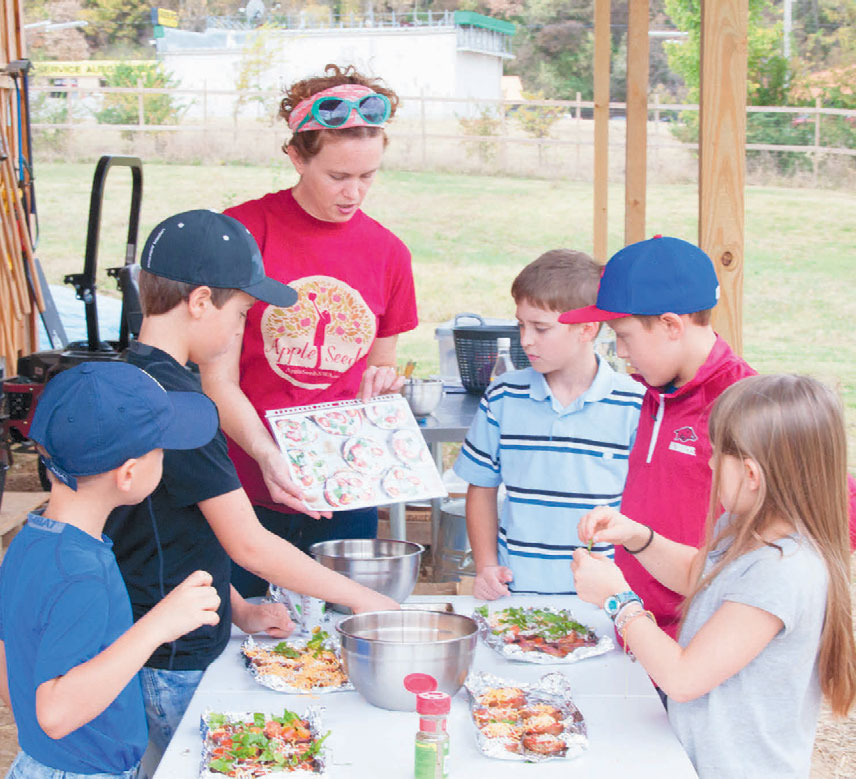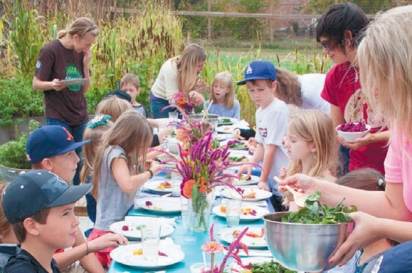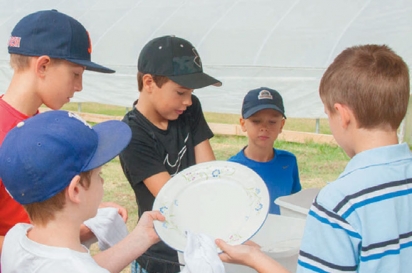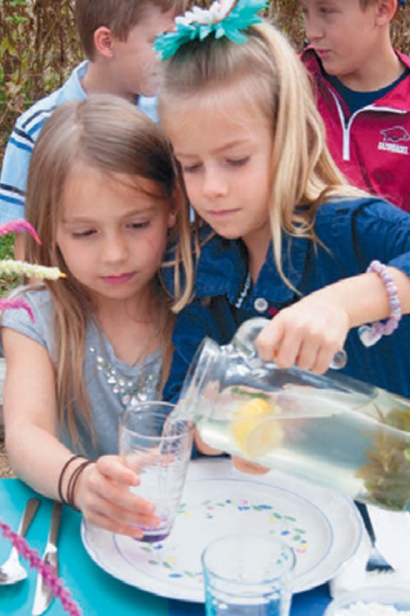Local Farm to Table Program Expands Children’s Tastes and Skills
"I do like Eggplant!"
Apple Seeds, a nonprofit teaching farm located in Fayetteville, brings students on site, where they are divided into teams to make dishes for the entire group to enjoy. One day last fall, a group of homeschool students visited the farm. The menu included eggplant pizza, beet hummus, spinach salad, and herbal tea.
Each team goes to a “recipe station,” where members read through their instructions, gather all necessary ingredients from the garden, and prepare the dish. There is emphasis on making sure each individual has the opportunity to contribute. For instance, if 15 basil leaves are needed for the eggplant pizza recipe, each child on a five-member team picks three leaves. While in the garden space, Apple Seeds team members talk with the children about walking in (and only in) the rows and about being gentle with the plants: careful not to damage the plants by stepping on them or yanking their fruits or leaves.
“We are really promoting kids being excited about healthy food,” said Mary Thompson, Apple Seeds co-executive director. “We hope to open doors to children so they realize they can make real food on their own, and it is fun.
Eggplants, tomatoes, and basil leaves are picked until the students have what they need for an eggplant pizza. Then, off to the work station they go, where they learn to cut produce using child-safe knives and take turns reading the recipe aloud so each member of the team knows the next step.
“Every time my children have attended, they eagerly share their roles and responsibilities within the collaborative harvest and meal process,” said Ashley Parnell, whose four children, Bess, 10, Rosey, 9, Myer, 6, and Casey, 3, have all experienced the program through the homeschool network. “The program provides a sense of responsibility and teamwork, facilitating an appreciation and excitement for the farm to table process.
At the hummus station, for example, one child may measure out a tablespoon of olive oil, another will add the beets, and another will stir or press the button for the blender.
The herbal tea group walks the garden and determines which mints would go well together to make a cool, refreshing beverage. When they are finished, they set the table for the group, including ‘real plates and silverware and fresh flower arrangements.
When each group finishes their dish, they bring it to the main table, where the food is served family style. Participating in its production makes some children more likely to try new foods.
Before preparing their dishes, each child completed a survey with a series of fruits and vegetables pictured. They were asked to indicate whether or not they have tried the item before and if they like it.
At the end of the group meal, the children took the survey again. The results show that opinions become more favorable toward new and different produce after cooperating to create the meal.
On the day that Edible Ozarkansas was present, 15 percent of children said they were willing to try eggplant in the pre-survey. But after harvesting and preparing the eggplant pizza, 90 percent of the students tried it.
There was not a specific measurement for how many children asked for seconds, but Mary said they run out every time it is offered.
When the meal is over, the children clear the table, place compostable scraps into a separate bin from non-compostable items, and wash the dishes right there in the middle of the farm.
“Every child deserves to experience the Apple Seeds farm to table program,” Ashley said. “Immediately following the programs, my kids insist upon a trip to the grocery store so we can grab any ingredients needed to replicate the meal they have just prepared at the farm. With only the recipes/instructions provided by the Apple Seeds team, the kids have proudly cooked dinner for the entire family (much to my husband’s delight). The farm to table program has truly been an inspiration and a delight to our family.”
The farm to table dinners are open to public or private schools, homeschooled students, or any group who wants to participate. They are scheduling new sessions now. The cost is $10 per child, with a 15-child minimum and 30-child maximum.









